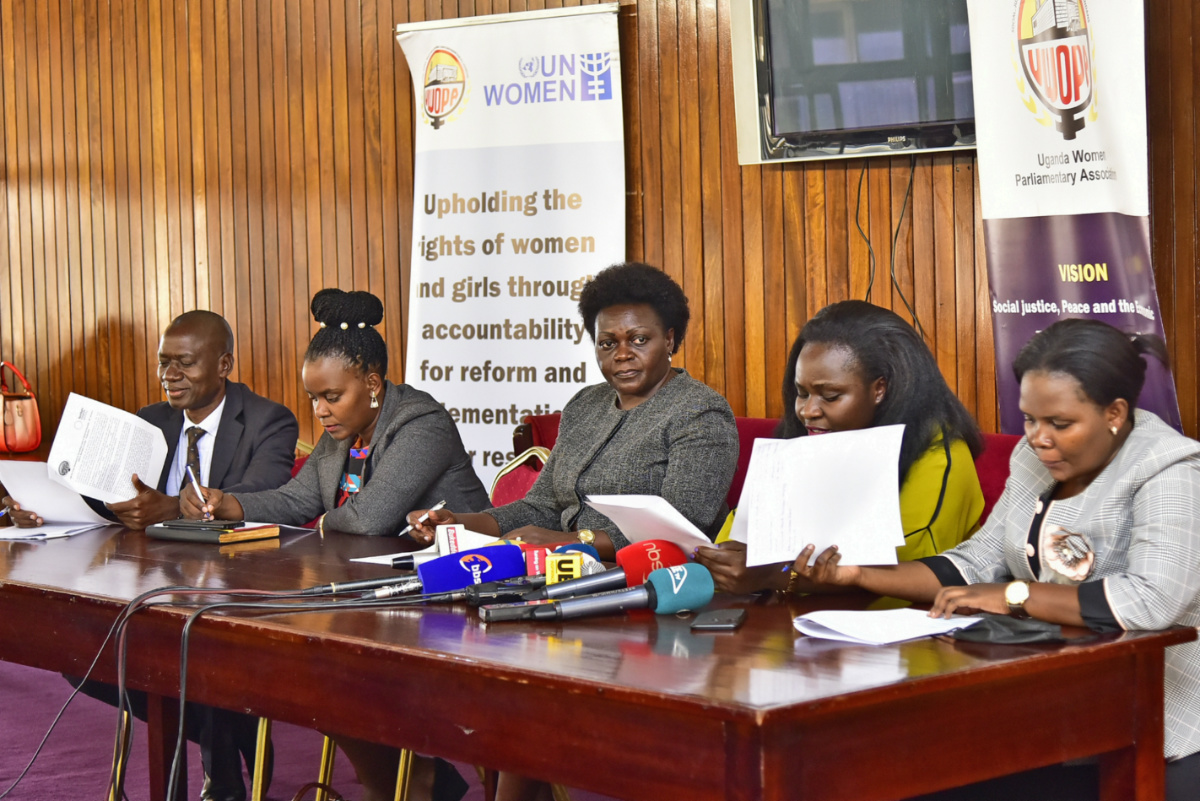Kampala, Uganda
The passing of legislation this month detailing how matrimonial property should be shared between the surviving spouse, lineal descendants, and the other dependents after someone dies without a will has stirred mixed reactions among Christians in the nation.
The Succession Amendment Bill 2021, which was passed on 8th February, is intended to end wrangles over matrimonial property that have for decades gripped families in Uganda – and seen the eviction of widows and children – by ensuring equity in the distribution of the deceased estate after an intestate death.

Members of the Uganda Women Parliamentary Association addressing a press conference recently with UWOPA chairperson Sarah Opendi (centre). The UWOPA were among those who pushed for the passing of the Succession Amendment Bill 2021 to protect widows. PICTURE: Courtesy of UWOPA website).
Under the Bill’s provisions, anyone who evicts or attempts to evict a surviving spouse, lineal descendant, or a dependent relative entitled to occupy the residential house or any other residential holdings commits an offence and is liable to a fine of 3.3 million Ugandan shillings (about $US938) or imprisonment up to seven years or both. It also prohibits “intermeddling” with the estate of deceased persons with those who do so liable to fines up to 20 million Ugandan shillings (about $US5,690) or imprisonment of up to 10 years, lifts the share of the estate given to the surviving spouse from 15 per cent to 20 per cent and specifically allocates 20 per cent for the education of any children still in school.
While the issue of matrimonial property inheritance has long been controversial in Uganda – with some widows forced out of their matrimonial homes upon the death of their husbands, the Bill has also provoked a heated debate over who is considered a legitimate spouse. Some MPs have argued that failing to recognise women who live in cohabiting relationships – that is, living together without being married – is discriminatory despite the government’s insistence that cohabiting spouses should formalise their relationships in order to benefit from the law. Data from the Uganda National Population Census 2014 shows that more than 64 per cent of Ugandans above 18 years are living in cohabiting relationships.
The Bill, which is yet to be signed into law by President Yoweri Museveni, has met with a sharp response from some Christian leaders.
Pastor Solomon Male, executive director of Christian organisation Arising for Christ, said the Bill was “inconstant with the reality on ground in Uganda”.
“Many Ugandans including Christians are cohabiting and this law has just excluded millions of them. How can you draft a law that considers a small section of people?” he said, describing the Bill has “unfair, barbaric and fraudulent and will cause more instabilities in families instead of reducing them.”
“Instead of excluding cohabiting spouses, the MPs should have made sure that the Bill formalises marriages in cohabiting relationships,” he said.
But Jude Mbabali, president of the Uganda Catholic Lawyers Association – an umbrella body for Catholic lawyers in the country – said the proposed law would protect surviving spouses and lineal descendants, particularly in Christian marriages. He added, however, that the education of the public would be key to the new law’s success.
“I don’t think that the biggest problem of the current Succession Act has been the gaps filled with the amendments, but rather the ignorance of the public about the law,” Mbabali said. “The existing Act says surviving spouses should not be evicted from the matrimonial houses but some people go ahead and evict them.”
Sarah Opendi, chairperson of the Uganda Women’s Parliamentary Association, said the legislation is important for women.
“Many women have been thrown out of their matrimonial homes when the man dies. This time it will not happen because they have the backing of the law.”
Rev Dr Grace Lubaale, a lecturer at Kyambogo University in Uganda, also praised the Bill.
“The Bible has no description of the succession law as far as I know and everything else on succession is left to the Holy Spirit to guide so I congratulate Ugandans that now we have a clearer succession law,” Lubaale said.
He said he agreed with excluding cohabiting spouses from being able to inherit under the Bill’s provisions, advising that people in such relationships should upgrade them, and argued that even in polygamous families, matrimonial homes should be reserved for only the surviving official spouses.
Prosper Mubangizi, a public policy analyst working with World Vision Uganda, argued that excluding cohabiting spouses in the Bill will incentivise many such couples to seek legal union within legally recognised institutions such as churches or courthouses. Mubangizi further supported the clause in the Bill that recognises that daughters can also be heirs of their deceased fathers which he said will enforce equality and equity of distribution.
It’s not the first time President Yoweri Museveni has been asked to assent to the Bill. In April last year, he declined to do so on grounds that it would cause disharmony between the surviving spouses and the dependent relatives.
The President was concerned particularly by a clause that stated that where the intestate is survived with no lineal descendants, the spouse shall receive 80 per cent of the property and the dependents 20 per cent. He argued that the clause would not only be unfair to the dependent relatives but cause serious misunderstandings.






